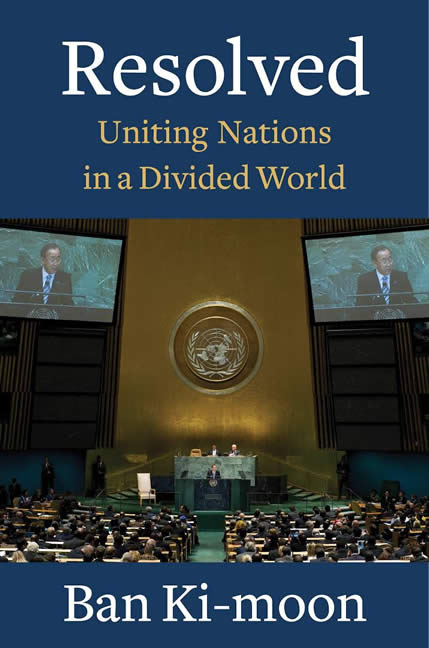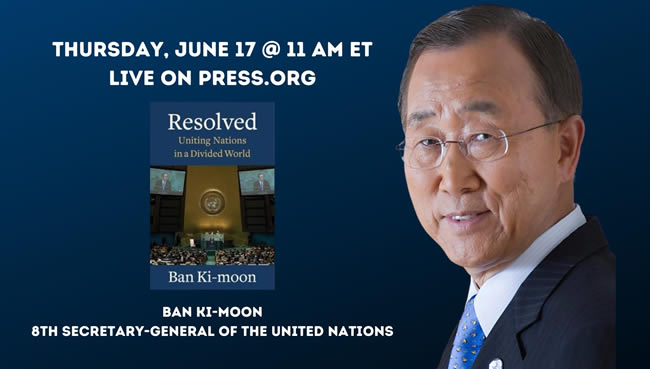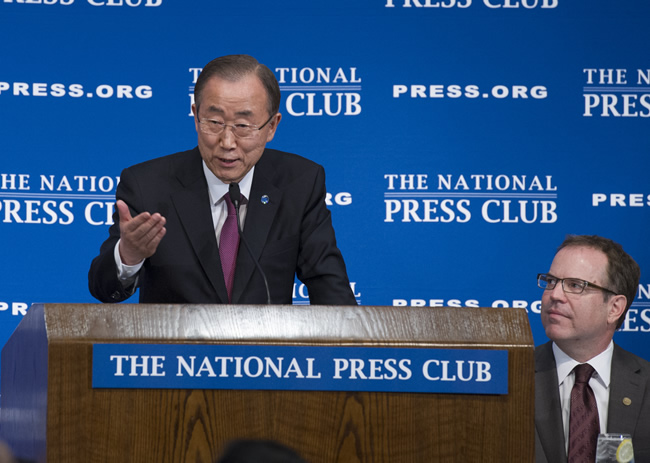« Rating Agency QS I-Gauge hosts Redefining Institutional Strategy for Excellence (RISE) Conference Punjab Edition in India. | Main | Joint Statement on Spectator Capacities at the Olympic Games Tokyo 2020. »
June 20, 2021
Former Secretary-General of the United Nations, Ban Ki-moon, asks 'Global Citizens' to Cooperate more Closely.

Photo: The cover of “Resolved: Uniting Nations in a Divided World” by Ban Ki-moon. Columbia University Press.


Photo: UN Secretary-General Ban Ki-moon (left) addresses the National Press Club in Washington, D.C. He discussed the challenges and opportunities that the United Nations faces in its 70th year, from fostering sustainable development and dealing with climate change to confronting violent extremism. He took questions during an hour-long session. At right is John Hughes, President of the National Press Club. April 16, 2015. UN Photo/Eskinder Debebe. [File Photo].
Washington, DC, June 18, 2021 — Former United Nations Secretary-General Ban Ki-moon called for a return to multilateral diplomacy and for people to be “global citizens.” He was speaking during a National Press Club Virtual Headliners Book Event on Thursday.
In a discussion coinciding with the release of his new book “Resolved: Uniting Nations in a Divided World,” Ban said global alliances have fractured amid the crises of coronavirus, climate change, and refugees fleeing conflict. He blamed world leaders for not doing enough.
“Why are we not doing more and better? For me, the fault most often lies with the leaders of the world,” Ban said. “Too many autocrats and also dictators put themselves before their countries and before the people who elected them.”
That fracturing of global alliances undermined the world’s response to COVID-19, mainly when the United States chose to withdraw from the World Health Organization, a move Ban called “totally unacceptable.” And he said the wealthiest countries “looked inward first,” meaning an uneven distribution of vaccines.
However, the recent G7 summit in the United Kingdom gave Ban some reasons for optimism as leaders there agreed to share 1 billion doses with poorer countries and reaffirmed their pledge of $100 billion a year for poorer countries to help them fight climate change.
But he criticized the United States, which under the Trump administration, stepped back from the global fight against climate change and withdrew from the Paris climate accord.
“This kind of leadership has shown no concern to the people, and it is only the people on the ground who will suffer,” Ban said. “This is what I found heartbreaking.”
And he said the UN could do more to help, especially in Syria, which has struggled for a decade amid civil war and a humanitarian crisis. Instead, Ban said, it is paralyzed and unable to “deliver timely, effective, and powerful messages or actions because of the divisions among the Security Council members, particularly veto-power members.”
Multilateralism has borne good work in recent years, Ban said, especially in getting 196 signatories for the Paris climate accord and adopting the UN’s 17 Sustainable Development Goals. But he said there is “so much work ahead,” not only in fighting climate change but also promoting peace in Myanmar, Afghanistan, Israel, and elsewhere.
Ban served as UN Secretary-General from January 2007 to December 2016. His tenure coincided with numerous incidents, including the Arab Spring, nuclear proliferation in Iran and North Korea, the Ebola epidemic, and brutal new conflicts in Central Africa.
Ban, who served as a South Korean diplomat and foreign minister before becoming the UN’s eighth Secretary-General, said his home country showed what is possible. Ban recalled being raised during the Korean War, then coming of age and watching the country grow from a dictatorship to a “stable and prosperous democracy.”
“Without the United Nations, Korea would not be as it is today,” Ban said.
Resolved is Ban Ki-moon’s account of his decade at the organization’s helm during a period of historical turmoil and promise. Meeting challenges and resistance with a belief in the UN’s peacekeeping mission, development, and human rights, he steered the United Nations through a volatile period. As secretary-general, Ban also forged global agreements to fight extreme poverty and address the climate crisis.
Ban performed what has been called “the impossible job on this earth” with a genuine belief in collective action and global transformation. Freed from the diplomatic constraints of a lifetime of public service, he offers a candid assessment of the people and events that shape this era and a bracing analysis of what lies ahead.
The one-hour program streamed live on the National Press Club’s website and YouTube Channel. Thus, it was accessible to both the media and members of the general public.
Founded in 1908, the National Press Club is the “World’s Leading Professional Organization for Journalists.” The Club has about 3,000 reporters, editors, and professional communicators worldwide, representing nearly every major news organization. It hosts almost 2,000 events per year in its 54,000 square foot facility located in downtown Washington, just three blocks from the White House.
Source: National Press Club, Washington, DC
|GlobalGiants.Com|
— The Editor is a Member of the National Press Club.







Edited & Posted by the Editor | 3:56 AM | Link to this Post







